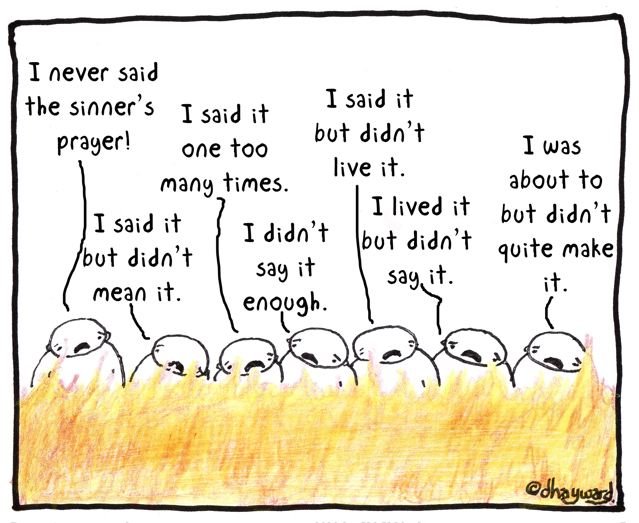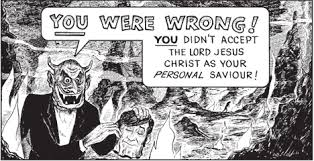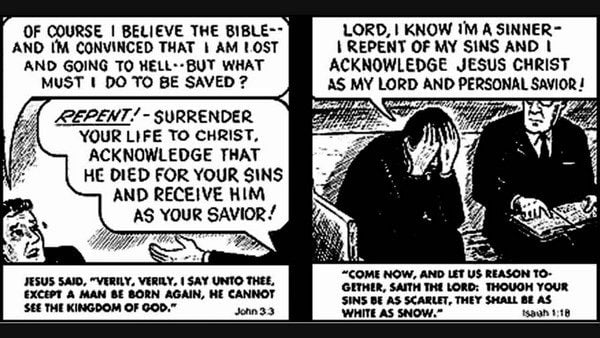
Why do Evangelical churches, pastors, and parents use scare tactics and methodologies to elicit salvation decisions from their young children and teenagers? Why are high-pressure tactics used to get children to ask Jesus to save them and forgive their sins? Why can’t Evangelical parents wait until their children are older — say late teens — before pressuring them to repent of their sins and ask Jesus to become their Lord and Savior?
In what follows, I will attempt to explain the theological beliefs that drive Evangelicals to treat their children like prospects for buying new vacuüm cleaners or Florida timeshares. Week after week, Evangelical pastors preach the gospel, imploring non-Christians to admit they are sinners and in need of salvation and forgiveness. As I shall discuss at the conclusion of this post, many Evangelical preachers and churches go to extreme lengths to scare children into becoming Christians.
According to Evangelicals, because Adam and Eve sinned against God in the Garden of Eden, all humans come into this world with a sin nature. This means that humans are born sinners, and not that they become sinners. Humans have no choice in the matter. Adam and Eve, as the first humans, are the father and mother of the human race. Because they were sinners, so are we.
God’s punishment for human sin is that every human must die physically and spiritually (first and second death). Eternal punishment in a burning lake of fire and brimstone — Hell and the Lake of Fire — awaits all humans after death.
Sometime in the future, Jesus Christ (God) will come back to earth on a white horse. Once he arrives, he will defeat Satan and his followers, vanquishing sin from the earth. Jesus will then resurrect the dead and judge them, along with those who are still alive when He returns. Those who are Christians will be rewarded with a room in the eternal Kingdom of God. Everyone else will be cast into the Lake of Fire. Once this final judgment is completed, God will make a new Heaven and a new Earth. (I am well aware of the various eschatological schemes. I am trying to paint a general picture without getting caught up with all the various end-times interpretations.)
Since hell awaits all humans, the only way to escape the eternal pain, suffering, and darkness of the Lake of Fire is for humans to admit that they are sinners and that Jesus — thanks to his death on the cross, paying for our sins and satisfying God’s wrath — is their only hope for salvation and forgiveness. Only those who put their faith in Jesus will go to Heaven when they die. (Again, I know that there are various soteriological schemes. I am trying to give the reader a broad picture without going into all the details concerning the order of salvation, Calvinism, Arminianism, etc.)
It should come as no surprise, then, based on the aforementioned core beliefs, that Evangelical churches, pastors, and parents are worried about their children going to Hell when they die. Most Evangelicals believe that, while all humans are born into the world with sin natures, children aren’t accountable for their sin until they reach a certain age or a certain intellectual capability (none of which is taught in the Bible). Some Evangelicals believe that the age of accountability is age twelve, whereas other Evangelicals believe that children are accountable for their sin the moment they understand the difference between right and wrong. All Evangelicals believe it is vitally important for their children to get saved as soon as possible — the younger, the better. It is not uncommon for Evangelical children to become Christians before they enter elementary school. In many Evangelical sects, formerly saved children, make new commitments to Christ — rededications — as teenagers. It is also not uncommon to hear of adults who have repeatedly rededicated their lives to Christ. As one old preacher said, just keep praying and asking Jesus to save you until it sticks.
Many Evangelical churches have what are called revivals. Hired guns called evangelists hold days- and weeks-long meetings at churches with the express purpose of “reviving” Christians and saving the lost. These evangelists are known for their fire and brimstone preaching, complete with stories about people who died without becoming Christians. These stories are key to evangelizing the lost. The unsaved, according to evangelists, need to know that every breath they breathe is a gift from God, and since the appointed time of death could happen at any moment, it is vital that sinners get saved today.
Evangelists held numerous meetings for me during my pastoring days. Two come to mind, both of whom went to great lengths to scare children and teenagers (and adults) into getting saved. One man was Dennis Corle. Corle preached several meetings for me in the 1980s. During one meeting, Corle asked if he could meet for a short time every night with the church’s children. I said yes, not bothering to ask why Corle wanted to do so. Imagine my surprise when I read a Sword of the Lord report of the Corle revival meeting at our church which stated that dozens of children were saved. Evidently, Corle spent his time with the children scaring the living Hell out of them. And it worked. Previously saved children even made new professions of faith.
Another evangelist who comes to mind is Don Hardman. (Please see The Preacher: The Life and Times of Donald A. Hardman, A Book Review and Laura’s Light by Laura Hardman, A Book Review .) Hardman held numerous meetings for me at two different churches. Some of the meetings were two weeks long — every weeknight, Saturday, and twice on Sunday. Hardman would often come out of the pulpit and address attendees personally, calling them by name if he knew them. At one such meeting, Hardman zeroed in on teenagers, going down the pews pointing his finger, and reminding them that God saw everything they did. Needless to say, this scared a number of attendees — most of whom were church members — and come invitation time, numerous people came forward to get saved or get “right” with God.
Corle and Hardman were hardly unique as far as evangelists go. I sat in a number of revival meetings during my days as a Christian and a pastor, and I heard evangelist after evangelist attempt to psychologically manipulate people into making decisions for Christ.
Evangelists rely on love offerings to fund their ministries. These hired guns know that good love offerings and future engagements rely on them producing decisions. Sinners and backsliders walking the sawdust trail (a reference to yesteryear when evangelists held tent meetings and covered the aisles with sawdust) to the front of the church so they can do business with God, are visible demonstrations not only of God’s power, but the evangelist’s ability to goad, manipulate, shame, and scare people into making decisions.
Some evangelists, using the Billy Graham model, ‘prime the pump’ by having trained Christian altar workers come forward during the invitation time. These altar workers give the unaware the illusion that God is moving and people are being saved. Contrary to Donald Trump saying that he invented the phrase ‘priming the pump,’ Evangelical evangelists have been talking about and using this practice since the 1920s. While many evangelists don’t use such a crass phrase as ‘priming the pump,’ and instead use less-offensive phrases such as ‘helping sinners take the first step’, I have heard several notable evangelists utter the phrase. The late Joe Boyd is one evangelist who comes to mind.
In the 1970s, I attended Trinity Baptist Church in Findlay, Ohio. It was there that I was, at the age of fifteen, saved and called to preach. As was typical of Independent Fundamentalist Baptist (IFB) churches during the church growth heyday, Trinity held two services on Sunday and one on Wednesday, along with Sunday school before the morning service and youth group before/after the evening service. The goal of every service was the same: the salvation of sinners and the reclamation of backsliders. Added to the weekly schedule of services were revival meetings. These revival meetings were special events geared towards reaching non-Christians. Church members were encouraged (commanded) to invite their friends, neighbors, and everyone they came in contact with to the revival. Get them to the revival, the thinking went, and let the evangelist — uh I mean God — do the rest.
These revival meetings were high-pressure events. During the invitation, church members were encouraged to speak to their visitors about the condition of their souls. Countless prospects for Heaven were badgered into coming to the front where altar workers would take them through the plan of salvation (the Romans Road). Those who prayed the sinner’s prayer and answered the correct questions were deemed saved. At the conclusion of the service, the newly saved were mentioned by name to congregants who then showed their approval by saying AMEN! Afterward, these newly minted Christians stood at the front so their new brothers and sisters in Christ could shake their hands, hug them, and give them spiritual advice.
One Wednesday night, a friend of mine by the name of Deke Roberts came with me to the Wednesday night service. During the invitation, one of the high-pressure saleswomen of the church came to Deke and started asking him questions about his spiritual condition. After being sufficiently badgered, my friend went forward and prayed the sinner’s prayer. Several days later I asked Deke about his salvation decision. He told me that he got “saved” just so that lady would leave him alone!

Some Evangelical churches use movies and drama events to lure people into getting saved. Teenagers, in particular, are the focus of these events. During my teen years, Trinity showed movies such as The Burning Hell and A Thief in the Night.
These movies were quite scary, warning sinners of the danger of waiting until tomorrow to be saved. During my ministry years, drama presentations became a popular way to get people saved. Hell Houses and dramas such as Heaven’s Gates, Hell’s Flames were (and still are) used as evangelistic tools to reach the lost. Thousands and thousands of people have made professions of faith through these manipulative tools.
Let me conclude this post with an honest reflection on my own use of psychological manipulation. At the time, I wouldn’t have considered my actions as manipulation, but I now know they were. Believing that life was short and Hell was real, I felt burdened to use any means necessary to reach people with the gospel. For many years, Sunday after Sunday, service after service, I preached the gospel, using poignant stories and passages of Scripture to remind sinners of the danger of waiting to get saved. Hundreds and hundreds of people made professions of faith and got right with God during my time pastoring churches in Ohio, Texas, and Michigan. While I deeply regret manipulating people, in my defense I was only modeling that which I had experienced growing up in Evangelical churches and attending an IFB college. I did the only thing I knew to do. Fortunately, in the late 1980s and early 1990s, I began moving away from using such tactics. Embracing Calvinism put an end to my use of altar calls. While I still passionately chased after the souls of men, I left it up to “God” to save sinners. Needless to say, once I embraced Calvinism, the number of people saved under my ministry greatly decreased.
Did you grow up in an Evangelical church? Did the church hold revival meetings? What techniques did the church use during church services to “reach the lost”? Please share your thoughts in the comment section.
Bruce Gerencser, 68, lives in rural Northwest Ohio with his wife of 47 years. He and his wife have six grown children and sixteen grandchildren. Bruce pastored Evangelical churches for twenty-five years in Ohio, Texas, and Michigan. Bruce left the ministry in 2005, and in 2008 he left Christianity. Bruce is now a humanist and an atheist.
Your comments are welcome and appreciated. All first-time comments are moderated. Please read the commenting rules before commenting.
You can email Bruce via the Contact Form.






